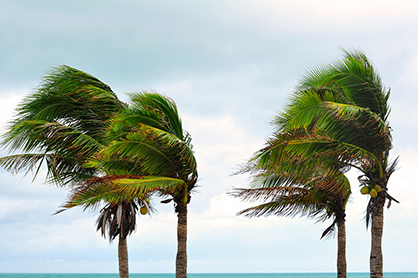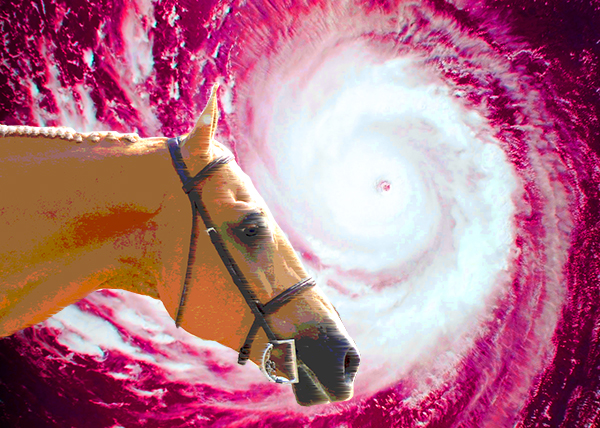Helpful Horse Information Ahead of Hurricane Florence Landfall
As of Wednesday morning at 8 AM EDT, The National Hurricane Center is tracking Hurricane Florence to make landfall somewhere on the eastern coast of the Carolinas by the early weekend. With maximum sustained winds of 130 mph, this powerful category 4 hurricane is expected to dump as much as 40 inches of rain on the Eastern Seaboard. Evacuations have been ordered for as many as 1.7 million people in the Carolinas and Virginia.
North Carolina
Because of the predicted path of Hurricane Florence, several equine facilities will not be open as evacuation sites. They include the Hunt Horse Complex at the N.C. State Fairgrounds in Raleigh, the Senator Bob Martin Eastern Agricultural Center in Williamston, and the Southeastern North Carolina Agricultural Events Center in Lumberton. However, the Virginia Department of Agriculture has shared a list of possible evacuation sites.
East Coast Evacuation List- http://www.ncstatefair.org/documents/EastCoastEvacuationList.pdf
Virginia
The Virginia Department of Agriculture has also coordinated a list of equine evacuation sites, as well as online resources for hay and feed.
Virginia Evacuation List- http://www.vdacs.virginia.gov//pdf/horse-evacuation-resources-florence.pdf
In light of the pending hurricane, Virginia has waived animal import requirements for owners and animals evacuating. The waiver is temporary and expires September 30, 2018.
- Horses evacuated to Virginia with a negative Coggins test in the past 12 months will be admitted without an interstate Certificate of Veterinary Inspection (CVI), provided current Coggins paperwork accompanies the horse.
- Horses evacuated to Virginia without a Coggins test in the past 12 months will be admitted without an interstate CVI, provided they be allowed to return to their state of origin without a current Coggins or CVI. They must undergo Coggins testing if they remain in Virginia past September 30, 2018.
- All other animals evacuated to Virginia will be admitted without an interstate CVI provided they meet all import requirements if they remain in Virginia past September 30, 2018.
However, the state waiver doesn’t require that facilities waive their own requirements. Therefore, it is prudent to check with individual facilities ahead of evacuation.
The VDACS also has provided a set of recommendations for farms that house livestock. Commissioner for the VDACS, Jewel Bronaugh, encourages all residents to take the proper precautions.
 “I encourage all Virginia farmers to begin taking precautions today to help safeguard their families, livestock and farms as Hurricane Florence approaches. Farms are asset-heavy with expensive buildings, equipment, animals and other tools of the trade, so taking precautions today may save thousands of dollars in property loss,” she says. “All pet owners should prepare themselves and their pets before the storm hits. This is even more important for owners of horses because of their size and the special equipment needed to transport them if owners decide to evacuate.”
“I encourage all Virginia farmers to begin taking precautions today to help safeguard their families, livestock and farms as Hurricane Florence approaches. Farms are asset-heavy with expensive buildings, equipment, animals and other tools of the trade, so taking precautions today may save thousands of dollars in property loss,” she says. “All pet owners should prepare themselves and their pets before the storm hits. This is even more important for owners of horses because of their size and the special equipment needed to transport them if owners decide to evacuate.”
- Monitor local weather reports for up-to-the-minute information on the storm
- Prepare your household for the storm by creating an emergency kit with flashlights, batteries, drinking water for humans and pets, medications, emergency numbers, first aid kit, dust masks and a supply of food to last 3 or 4 days.
- Make a communication plan that identifies your evacuation routes to where your family will meet and how everyone would get there should you need to evacuate.
- Charge cell phone batteries and have extra batteries for radios.
- Store or secure items or equipment that may blow away or blow into structures. This includes lawn furniture and ornaments.
- Inspect all barns, outbuildings and other structures for broken or weak components and make repairs before the storm hits.
- Stock up on feed, food and livestock supplies. Be prepared to be self-sustainable for three days.
- Secure livestock and other animals. If necessary, build berms for them to stand on in low-lying areas.
- Stock up on nails, screws, and plywood to board up windows and nail doors and windows shut.
- If your operation uses vent fans, water pumps, milking machines or other critical electrical equipment, purchase a gas-powered generator and plenty of fuel.
- Ensure a source of clean water so livestock won’t have to drink flood water.
- Store fertilizers, pesticides, treated seeds and other such compounds up high and away from floodwaters and animals.
- Do not drive across any flooded roadway, as it only takes six inches of water to move a vehicle and roads may be washed out beneath the floodwaters.
- Mark animals with an identifier so they can be returned if lost. This can include ear tags with name of farm and/or phone numbers, brands, paint markings on hooves or coat, or clipped initials in the hair.
- Know your local emergency managers, including the sheriff and animal control officer. They are in charge during a disaster.
- If strong winds knock down trees, make farm lanes and houses accessible to delivery vehicles as soon as it is safe to do so.
- Coordinate with neighbors before the storm to discuss what resources can be shared in the event of power outages or flooding.
- For more emergency preparation tips, please visit Virginia Department of Emergency Management Prepare + Recover.
Tips for horse owners:
- Be sure your horse is current regarding vaccinations for tetanus and the encephalitis viruses (Eastern Equine Encephalitis and West Nile Virus).
- Be sure that your horse has multiple forms of identification.
- Store the record for the microchip number, if present, in an accessible location. VDACS also recommends keeping a second copy of this information with a family member or friend in a distant location where it will be easily accessible.
South Carolina
The South Carolina Department of Public Safety has an excellent set of resources, including a detailed list of evacuation routes, evacuation zone list and maps to predict vulnerability to storm surge, list of local radio stations, and a list of the latest local news announcements.
Georgia
Georgia has also temporarily suspended interstate animal movement requirements for animals being evacuated from the hurricane. This only applies for animals coming into Georgia from North Carolina, South Carolina, and Virginia. The suspension will expire on September 30th, 2018.











